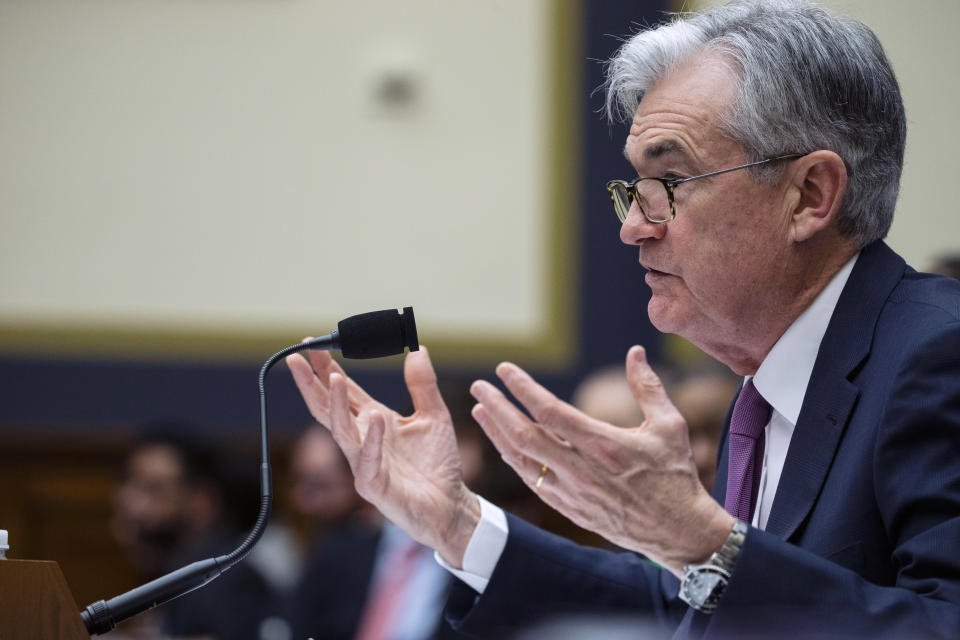Fed Chair Jay Powell grilled on China's cryptocurrency plans, US response
On Tuesday, Federal Reserve Chairman Jerome Powell gave his monetary policy report in front of the U.S. House Financial Services Committee, and then withstood hours of questions from members of Congress.
Rep. Bill Foster, a Democrat from Illinois, spent his entire five minutes asking Powell about cryptocurrency.
That line of questioning yielded some perspective from Powell that the Fed chair not previously given, and his responses could stoke optimism or disappointment from many in the cryptocurrency world, depending on how they want to parse his typically very deliberate word choice.
So, what did we learn about Powell and crypto?

Cautious on a Fedcoin
Federal Reserve Governor Lael Brainard revealed earlier this month that the Federal Reserve is looking into the possibility of designing and issuing a government-backed cryptocurrency, though she did cite “risks” the Fed sees. She specifically raised “the potential for a CBDC” or central bank digital currency.
Foster referenced Brainard’s remarks and asked Powell for his take. Powell made it clear that in his view, the U.S. dollar is working just fine: “Having a single government currency at the heart of the financial system is something that has served us well. It’s a very, very basic thing, it really hasn’t been in question, and I think before we move away from that, we should really understand what we’re doing. Preserving the centrality of a central, widely accepted currency that is accepted and trusted is an enormously important thing.”
He sounded pretty cautious about a central bank crypto (or “Fedcoin” as many have nicknamed it), but he also acknowledges that central banks around the world are at least looking into it.
“Every major central bank is currently taking a deep look at that,” Powell said. “We feel that’s our obligation, technology has now made that possible. I think it’s very much incumbent on us and other central banks to understand the costs and benefits and tradeoffs associated with a possible digital currency.”
Not compelled by a government-run ledger
The elephant in the room for the entire Fedcoin conversation is China.
Even as China has cracked down on certain cryptocurrencies and bitcoin miners in its country, Xi Jinping has urged Chinese companies to spur blockchain innovation, and now the PBOC (People’s Bank of China) is very close to issuing a state-run cryptocurrency.
Foster asked Powell if the Fed has “visibility” into what China is doing in this area and how far along it is. “Yes, we certainly have that,” Powell said. “But they’re in a completely different institutional context. For example, the idea of having a ledger where you know everybody’s payments, that’s not something that would be particularly attractive in the United States context. It’s not a problem in China.”
Indeed, a PBOC coin would obviously be centralized and run by the Chinese government, whereas the entire value proposition of bitcoin is that it is decentralized. In the U.S., where consumers are used to freedom and privacy, any financial ledger where the government has access to all the data will be greeted with heavy scrutiny.
Powell gives Libra big credit
Last fall, after Facebook’s plans for cryptocurrency Libra came under immediate fire from lawmakers, Mark Zuckerberg defended the project by warning politicians that if the U.S. stifled Libra, it would run the risk of losing the cryptocurrency race to China.
Indeed, China reportedly put its cryptocurrency plans into overdrive specifically to compete with Libra, leading at least one crypto news site to declare, “Zuckerberg was right.” (Meanwhile, 8 “founding members” of the Libra Association have since dropped out.)
Powell gave Libra credit on Tuesday, without Rep. Foster having brought up Facebook or Libra.
“Frankly, Libra really lit a fire,” Powell said, “and was a bit of a wakeup call that this is coming fast and could come in a way that is quite widespread and systemically important—fairly quickly, if you use one of these big tech networks like Libra did. We fully appreciate the importance of making quick progress—we have not decided to do this, though. There are many questions that need to be answered around digital currency for the United States, including cyber issues, privacy issues; many many operational alternatives present themselves, so we’re going to be working through all that.”
There’s a lot there for crypto flag-wavers to like: Powell credits Libra with prompting a global conversation around crypto and stablecoins; and the Federal Reserve is looking into it. But he also was careful to make clear that the Fed has not yet decided to create a Fedcoin. It is merely examining the possibility.
Foster, in response, clearly focused on China’s quick progress in this area, told Powell: “I urge you to keep the fire lit.”
—
Daniel Roberts is an editor-at-large at Yahoo Finance and closely covers bitcoin and blockchain. Follow him on Twitter at @readDanwrite.
Read more:
Facebook-led Libra Association has lost 8 'founding members'
Lighting Labs, bitcoin startup backed by Jack Dorsey, closes $10 million Series A round
IRS adds specific crypto question to 2019 tax form
Cryptocurrency CEO who paid $4.6M for lunch with Buffett: 'It might be unrealistic'
Exclusive: SEC quietly widens its crackdown on ICOs
Read the latest financial and business news from Yahoo Finance
Follow Yahoo Finance on Twitter, Facebook, Instagram, Flipboard, LinkedIn, YouTube, and reddit.
